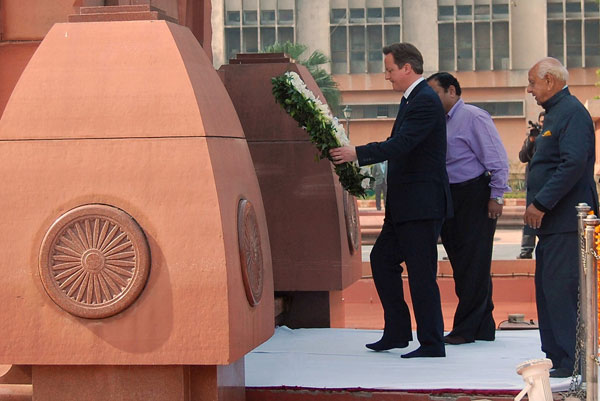
PAYING RESPECTS: Cameron lays a wreath in tribute to the Jallianwala Bagh martyrs at the Jallian wala Bagh memorial in Amritsar. — AFP photo
British PM lays a wreath at Jallianwala Bagh where British troops killed unarmed protesters in 1919
AMRITSAR, India: British Prime Minister David Cameron visited the site of a colonial-era massacre in India yesterday, describing the episode as “deeply shameful” while stopping short of a public apology.
On the last leg of a three-day trip aimed at forging deeper economic ties, Cameron took the bold decision to visit the city of Amritsar and tackle an enduring scar of British rule on the subcontinent, which ended in 1947.
Dressed in a dark suit and bowing his head, he laid a wreath at the memorial to the victims at Jallianwala Bagh, where
British troops opened fire on thousands of unarmed protesters in 1919.
In a message in the visitors’ book, he wrote: “This was a deeply shameful event in British history and one that Winston Churchill rightly declared at the time as ‘monstrous’.
“We must never forget what happened here. And in remembering we must ensure that the United Kingdom stands up for the right of peaceful protest around the world.”
The number of casualties at the Jallianwala Bagh garden is unclear, with colonial-era records showing about 400 deaths while Indian figures put the number killed at closer to 1,000.
Bhusan Behl, who heads a trust for the families of victims, has campaigned for decades on behalf of his grandfather who was killed at the entrance to the walled area.
He said he was hoping that Cameron would say sorry for the slaughter ordered by General Reginald Dyer, which was immortalised in Richard Attenborough’s film “Gandhi” and features in Salman Rushdie’s epic book “Midnight’s Children”.
The incident, in which soldiers under Dyer’s command opened fire on men, women and children in the enclosed area is one of the most infamous of Britain’s rule and helped spur the independence movement.
“A sorry from a top leader would change the historical narrative and Indians will also feel that in some way they can forget the past and move on,” Behl told AFP before Cameron made his written remarks.
The move is seen as a gamble by Cameron, who is travelling with British-Indian parliamentarians, and could lead to calls for similar treatment from other former colonies or even other victims in India.
It immediately invited a debate in India about why Cameron was opening up old wounds and was stopping short of saying sorry. — AFP
